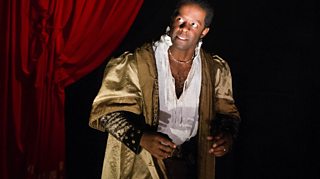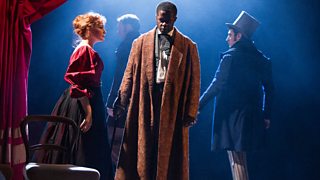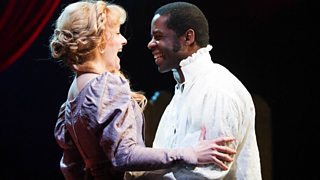
Adrian Lester as Ira Aldridge
What attracted you to the story of Ira Aldridge? How did you first hear his story? What research did you do?
I first heard about Ira Aldridge in 1998. Adrian (Lester) did a reading about him at a theatre festival in Brighton. He told me about Ira and his achievements in the theatre in the nineteenth century and I could not believe that I had not heard of him.
I had done a theatre studies A-level at school in Birmingham. I trained as an actor at RADA graduating in 1990. I had worked in the theatre for 8 years by then and I had never heard of Ira Aldridge.
Aldridge was a black American actor who came to Britain at the age of 18 and forged an amazing career. He performed throughout Britain garnering great reviews and played Othello at Covent Garden Theatre Royal in 1833. He went on to tour Europe where he was internationally recognized and celebrated. He was knighted by The Duke of Saxe-Meiningen, presented with a First Class Gold Medal from His Majesty Frederick William IV, given the Grand Cross of the Order of Leopold the Emperor Franz Joseph of Austria and the Imperial Jubilee de Tolstoy Medal from St Petersburg. He died in 1867 in Poland where he was given a state funeral.
Why had I not heard of him?
My research has been spread over many years. When I began in 1998 the Internet was in its infancy so I had to find Aldridge the old way, through books. I began at the Theatre Museum in Covent Garden, which is sadly no more, and found a single volume of biography by Herbert Marshall and Mildred Stock published in 1958. I spent the next three years following the trail they had set out in their book.
I contacted libraries in America to find out what archive they had - The Schomburg Centre, part of the New York Public Library, Northwestern University in Chicago, the Folger in Washington. They sent me tantalising lists of all the original papers, images and documents they had pertaining to Aldridge. I tried to get funding to go and study in America but was unsuccessful. And then I got acting work and was diverted. I have read a lot around the subject over the years; history, narratives, biography, literature. I built up a strong picture of the period and of Aldridge himself.

Adrian Lester as Ira Aldridge (Red Velvet production photos by Hugo Glendinning)
What was life like for a black actor in the USA in the 1800s? What kind of society did he grow up in and did this make it necessary for him to emigrate?
Ira could not work in the legitimate theatre in the US. He was born in 1807 and died in 1867. Slavery was not abolished in the USA until 1865.
Ira grew up in New York and at the age of 14 worked as a dresser to the actor Henry Wallack at the Park Theatre. He then joined Mr. Brown’s African Grove Theatre. Mr. Brown was an ex ships-steward who wanted a theatre for a black American audience. He bought a house precisely for this purpose. A young, talented black actor called James Hewlett led the company. Ira worked within this company. The theatre experienced many challenges from white society. Mr. Brown’s theatre was forced to move premises several times, the company was threatened, assaulted and the theatre burned down.
There were no avenues open for a classical actor of colour in the US at that time.

Red Velvet production photos by Hugo Glendinning
What is the context in which Aldridge gets his ‘big break’ at Covent Garden? What was the reaction?
Ira toured the provinces for 8 years and collected fantastic reviews. He became very popular and made good returns as his reputation grew. The audiences applauded him as an artist but also as a man from the lowest social strata of life succeeding because of his ability and talent. This was a reflection of dissatisfaction across Europe in general. The lower classes were agitating for the opportunity to move up the economic and social ladder.
When Edmund Kean, arguably the greatest actor of his generation, collapsed on stage in April 1833, Pierre Laporte, the manager of the Theatre Royal Covent Garden, asked Ira to step in as Othello
At that same time Parliament was about to vote on whether to abolish slavery in all British colonies. Feelings in London were running very high; there was a lot of money at stake. Pro-slavery lobbyists wrote long tracts about the positive effects of slavery on the idle Negro. The newspapers were owned by the wealthy, the wealthy invested in slavery. How then would the critics of those newspapers take to a black man confounding all arguments by performing Shakespeare on a national theatre stage?
When Ira played Othello at Covent Garden, the audiences were appreciative and the press was not.
Adrian Lester talks about Ira Aldridge
Did you write the role specifically for Adrian Lester and how was it working with him on creating the role?
I did not write this part for Adrian. Adrian reads everything that I write. He and Indhu Rubasingham, the director of this production, guided my hand over the seven years it took me to get this play on. I never assumed he would do it.
This was a project that Indhu and I were developing. In the end it was amazing that Adrian played Ira. Working with him has been a gift. His talent and absolute commitment has completely fulfilled my idea of Ira Aldridge.

Lolita Chakrabarti
Has the critical acclaim received by the play changed your life in any way?
Yes. It has been a relief to be recognized for this work. I always knew it was an important story but the lack of encouragement over the seven years I was writing it, was a hard pill to swallow. When Indhu Rubasingham took over the Tricycle as Artistic Director, her commitment to this project made it happen.

Indhu Rubasingham (Photo: Jane Hobson)
We sold out of tickets very quickly during both runs at the Tricycle and the run in New York took it to a new level. A lot of people within the entertainment industry came to see it, which is great for future work prospects. The most honest response to the play came from audience members who rarely go to the theatre. It was great to hear their experience of the play and their understanding of Ira.
The acknowledgement of Aldridge and his extraordinary achievements has been so gratifying. Now I feel he stands with Kean, Tree, Garrick, Kemble and Macready to name just a few. For me, that changes everything.

Red Velvet Production photos by Hugo Glendinning
What do you think the situation is like for BAME actors today? Are there still parallels with Aldridge’s life and career?
We’ve come a long way since Ira’s time but we still have a long way to go.
Are there parallels with Ira? I think so.
- Ira’s achievements were not celebrated in England they were celebrated abroad.
- Ira had to leave his home country in order to do the work he wanted to do.
- Ira’s skin colour was always significant in how the press reviewed his performances.
Sadly these things are often true today.
Were there any changes needed to produce the play for Radio?
Yes. The play has some particularly visual moments. For radio I obviously had to find a new way to make these visual moments live without losing sight of the character in expositional description. I enjoyed doing this version for radio. It’s lovely to see the play through words.
